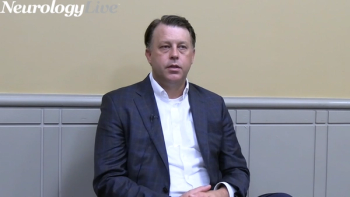
No serious adverse events were reported, and the therapy demonstrated a favorable safety profile over the 5-year study period.

No serious adverse events were reported, and the therapy demonstrated a favorable safety profile over the 5-year study period.

A group of experts from The Neuron Clinic shared their experience developing a novel inclusive clinical program to treat patients with early Alzheimer disease using lecanemab.

The hope is that NP001 could potentially slow the progression of the disease through its unique immunologic mechanism.

Overall, vatiquinone-treated patients demonstrated persistent effects on disease progression over a 144-week long-term period, leading to a future regulatory submission.

The disease area stronghold leader in neurodegeneration at Johnson & Johnson discussed data presented at AAIC 2024 highlighting different subtypes of Alzheimer disease that may lead to more personalized treatments. [WATCH TIME: 4 minutes]

RAG-18 is an saRNA delivered to muscle tissue to increase UTRN expression and compensate for DMD defects regardless of the location of mutation on DMD gene.

Patients aged 2-21 receiving apitegromab showed clinically meaningful motor function improvements, with a favorable safety profile consistent with long-term data, as Scholar Rock prepares for U.S. and EU regulatory submissions in Q1 2025.

Michelle Bravo, MD, an assistant professor of clinical neurology at the University of Miami, provided commentary on a rare case report of a subdural hematoma linked to spontaneous intracranial hypotension caused by a refractory CSF leak.

Over half of the patients (56.7%) discontinued at least one class of acute migraine medication within 12 months post-erenumab initiation.

The chair of neurology at Hospital Universitari Vall d’Hebron talked about the revision of the MS diagnostic criteria that will integrate new evidence, biological markers, and advanced MRI findings to enable earlier and more precise diagnoses. [WATCH TIME: 4 minutes]

The orphan medicinal product designation given by the European Commission was based on findings produced in research funded by the United States Department of Defense.

The assistant professor at the University of Naples discussed how implementation of new diagnostic criteria for multiple sclerosis will involve practical adjustments in imaging and diagnostic techniques as well as cultural changes in clinical practice. [WATCH TIME: 4 minutes]

Test your neurology knowledge with NeurologyLive®'s weekly quiz series, featuring questions on a variety of clinical and historical neurology topics. This week's topic is on insomnia.

Ongoing analysis of vamorolone's effects as a mineralocorticoid receptor antagonist in healthy adults is underway, with results to be presented at upcoming medical conferences.

The phase 2 study, expected to include 575 patients with acute migraine, will use percentage of participants with freedom from pain and freedom from the most bothersome symptom as the coprimary end points.

Neurology News Network. for the week ending October 5, 2024. [WATCH TIME: 4 minutes]

Over a 12-month period, patients showed sustained improvements in disease progression through valbenazine, regardless of concomitant antipsychotic treatment.

Take 5 minutes to catch up on NeurologyLive®'s highlights from the week ending October 4, 2024.

Amifampridine enhances neuromuscular transmission and relieves muscle weakness, showing promise for Lambert-Eaton myasthenic syndrome and other neuromuscular junction disorders.

Mind Moments®, a podcast from NeurologyLive®, brings you an exclusive interview with Daniel Ontaneda, MD, PhD. [LISTEN TIME: 27 minutes]

The neurologist at the University Hospital Center of Nice discussed whether radiologically isolated syndrome represents a pre-symptomatic phase of multiple sclerosis based on a hot topic session held at the 2024 ECTRIMS Congress. [WATCH TIME: 4 minutes]

Sleep is critical for physical and mental health, with its insufficiency leading to various disorders and increased health risks; thus, clinicians should integrate sleep assessments and hygiene strategies into their clinical care.

A duo of experts talked about a positive phase 2 trial of vidofludimus calcium, demonstrating reductions in serum neurofilament light levels and potentially slowing brain atrophy in patients with progressive multiple sclerosis. [WATCH TIME: 4 minutes]

The KINETIC 2 study did not show statistically significant improvement in essential tremor symptoms compared to placebo, leading to the termination of its development for this condition.

Transition to college life poses unique challenges for students living with migraine, and a comprehensive checklist helps ensure they are prepared for this critical phase.

The Total Posterior Spine System offers a promising alternative to spinal fusion, preserving mobility and reducing strain on adjacent spinal levels in patients with spondylolisthesis and spinal stenosis.

This trial aims to explore the role of the noradrenergic system in behavioral and cognitive outcomes and could lead to new therapeutic strategies for managing PSP.

ION464 is designed to inhibit the production of the alpha-synuclein protein, aiming to reduce the accumulation of this protein in the brain, which is believed to be a key factor driving neurodegeneration in MSA and Parkinson disease.

The director of the Huntington’s Disease Clinic at Vanderbilt University Medical Center gave commentary on the unique development of ATH434, its ability to target iron accumulation, and how it may slow disease progression in multiple system atrophy. [WATCH TIME: 3 minutes]